Science fiction often tackles humanity’s struggle with technology and the loss of free will. Directors George Lucas and Steven Spielberg, known for their shared interests in sci-fi themes, explore these concerns in THX 1138 (1971) and Minority Report (2002). Despite being made decades apart, these films delve into the conflict between technological control and individual freedom, posing timeless questions about human identity and morality.
Technology and Control in Different Futures
THX 1138 takes place in a post-apocalyptic subterranean world where emotional responses and individuality are suppressed. Conversely, Minority Report is set in a high-tech Washington, D.C. of 2051, where technology predicts and prevents crimes. Both films examine how advanced systems impose control over human lives, creating societies that extinguish individuality and choice.
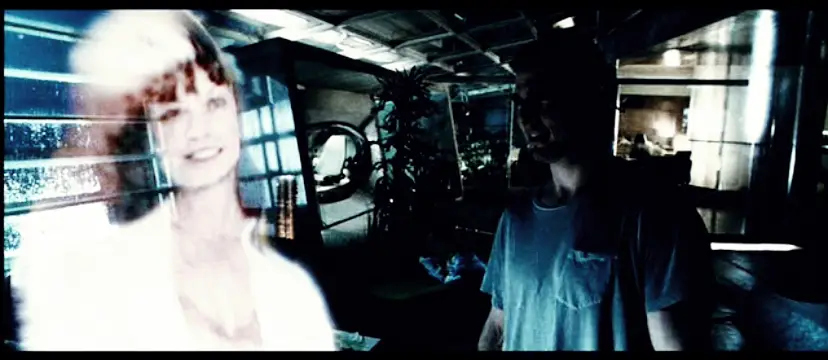
In THX 1138, society suppresses all emotions and attachments through drugs and rigid control. People live as workers stripped of personal identity, paired with mates only for functionality. In Minority Report, the Pre-Crime system uses “Precogs” to foresee murders, arresting individuals before crimes occur. Both films highlight how these systems aim to eliminate perceived dangers but, in doing so, also suppress fundamental human freedoms.
The Heroes’ Fight for Freedom
The protagonists in both films rebel against these oppressive systems. THX (Robert Duvall) begins to question his world when his mate LUH (Maggie McOmie) stops taking the government-mandated drugs and expresses a desire for love and family. Their rebellion escalates when LUH becomes pregnant, a forbidden act in their society. When LUH is taken by the authorities and liquidated, THX’s journey becomes one of escape and survival.
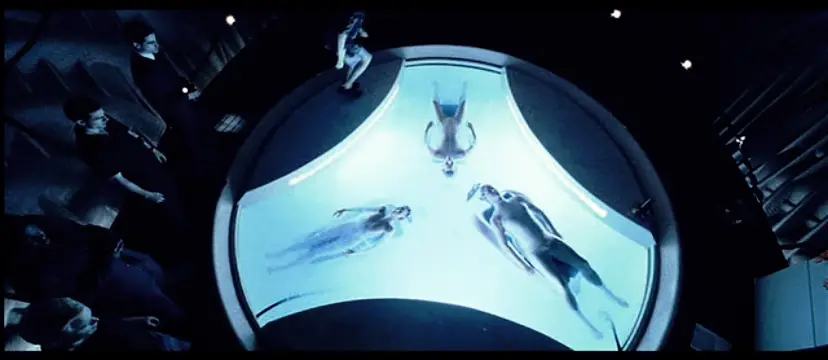
In Minority Report, John Anderton (Tom Cruise) is a dedicated enforcer of the Pre-Crime system. His world collapses when the Precogs predict he will commit murder. Haunted by the loss of his son, Anderton must prove his innocence while questioning the validity of the system he once upheld. Both characters defy societal norms and technology, driven by personal motives: love, loss, and the desire for freedom.
Themes of Human Nature and Identity
Both films pose critical questions about human nature. What defines humanity? Can free will coexist with systems designed to control it? THX’s love for LUH and Anderton’s need to uncover the truth reflect deep human traits that resist suppression. They act on instinct and emotion, violating the laws they once accepted.
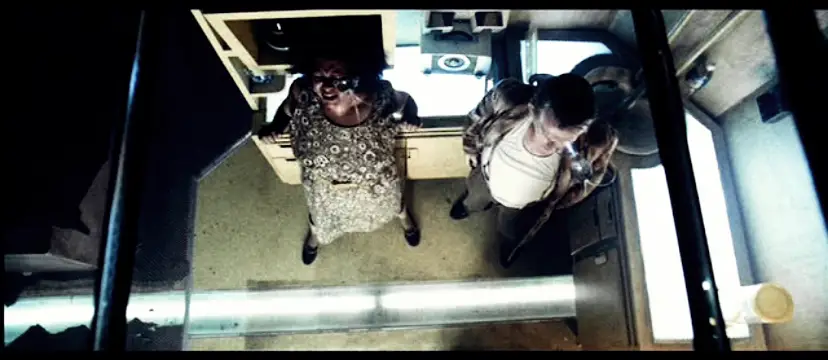
In THX 1138, human emotions and desires emerge as uncontainable forces. LUH’s yearning for family breaks through the government’s conditioning. THX’s decision to flee represents a rejection of a sterile, controlled existence. Similarly, Anderton’s determination to uncover the flaws in Pre-Crime shows humanity’s capacity for resilience and adaptability. His ultimate choice to reject violence, despite the system’s prediction, proves the persistence of free will.
Technology as Both Tool and Trap
In both films, technology is portrayed as a double-edged sword. It offers solutions but also enforces repression. In THX 1138, medication suppresses emotions, creating a docile society. Yet, this suppression causes accidents and inefficiencies. The city’s omnipresent surveillance reinforces control but strips people of privacy and identity.
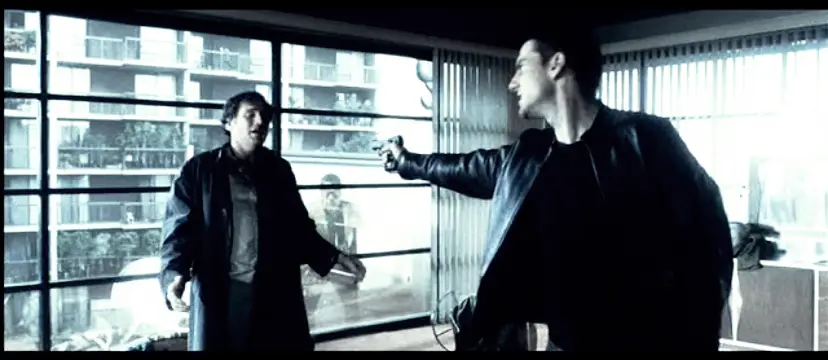
Minority Report takes a similar approach. Eye-scanning technology personalizes advertisements and monitors every move, turning convenience into entrapment. The Precogs, the backbone of Pre-Crime, are humans reduced to tools. Their predictive abilities make them powerful but also strip them of autonomy. Spielberg’s use of invasive camera angles mirrors the omnipresence of surveillance, amplifying the sense of confinement.
Religious and Moral Overtones
Religion plays a subtle yet significant role in both narratives. In THX 1138, the god-like figure OMM dispenses pre-recorded platitudes, reflecting a hollow, manipulative spirituality. Similarly, Minority Report invokes predestination through the Precogs, suggesting divine foresight. However, Anderton’s rejection of the Precogs’ prediction reasserts human agency over fate.
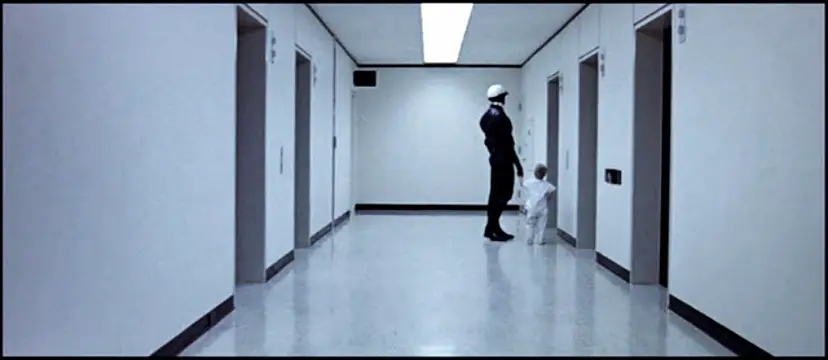
Both films critique the use of moral and religious authority to justify oppression. THX and Anderton’s defiance highlights the importance of personal conscience and the dangers of blind adherence to systems.
Struggles Against Surveillance and Oppression
Surveillance is a common thread in these films. In THX 1138, cameras and monitors invade every aspect of life. Even personal medicine cabinets promote compliance with cheerful advertisements. Minority Report depicts a similar invasion of privacy, where Anderton must evade retina scanners and robotic enforcers. These systems, designed to maintain order, expose the fragility of human freedom.
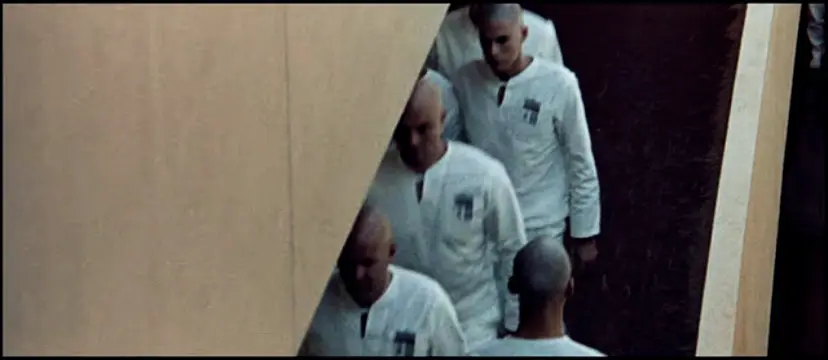
Both films use visuals to emphasize control. The sterile, white voids in THX 1138 represent dehumanization, while the sleek urban settings in Minority Report showcase technology’s dominance. However, the outskirts of these worlds offer glimpses of freedom. THX escapes to the surface, finding hope in a natural, untainted environment. Anderton, too, finds sanctuary in the countryside, where technology’s reach is limited.
Parallels with Other Sci-Fi Works
The themes of THX 1138 and Minority Report resonate in other sci-fi classics. Blade Runner (1982) explores the humanity of artificial beings, questioning who deserves to be called human. Similarly, A Clockwork Orange (1971) critiques attempts to remove free will, even from violent individuals, arguing that such efforts dehumanize both the individual and society.
Lucas and Spielberg address these themes uniquely, emphasizing humanity’s ability to resist control. THX’s escape and Anderton’s rejection of Pre-Crime show that even in the most repressive systems, individuals can assert their humanity.
The Cost of Freedom
Both films conclude with victories that come at a price. THX reaches the surface, leaving the safety of the underground city for the uncertainty of the natural world. Anderton dismantles Pre-Crime, ensuring freedom but allowing crime to return. These endings reject utopia, affirming that imperfection is an inherent part of humanity.
Conclusion
THX 1138 and Minority Report explore the tension between control and freedom, technology and humanity. Through gripping narratives and striking visuals, they challenge viewers to consider what makes us human and how far we should go to preserve it. As Lucas and Spielberg demonstrate, the fight for individuality and free will remains timeless, even in worlds dominated by technology.

